
Daily life in china
Yi, er, san, si.... (one, two, three, four ....). The voice from the neighboring school's harsh amplifier wakes me at 6.30 and proclaims that a new day has begun. Since I do not intend to follow today's morning gymnastics at all, I turn my deaf ear to the poor but high-sounding speakers, and sleep further for almost an hour. The next thing I register is Jens, rummaging in our room. I recognize that it's the end of my beauty sleep, and it is time to get up.
I praise myself lucky that we have hot water throughout the day and throw some water in my face. On with the long underwear and a woolen sweater - and I am ready to tackle another day at Fudan University in Shanghai. A quarter to eight a new crackling sound starts from the worn-out speakers. This time, a mix between a Chinese pop song and a march, I pull the collar up around the ears and move on to school, to yet another cold and damp winter day.
EXERCISE THE SONGBIRD
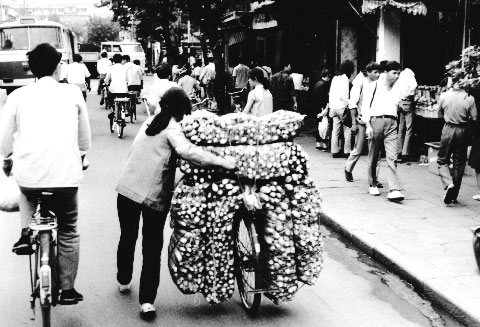
Morning traffic on the way to class at Fudan University.
It's already busy on the way to school. Many elderly are on the way home with their bird cage. They have been out exercise their songbird, while they themselves have done today's morning exercises along the sidewalk or in one of the city's parks. Or they may just have chatting with others about their grandchildren while they listened to the birds chirping.
Countless wondering cyclists pass me, while they ring their bells. Some use the bell so diligently that I am convinced that it is a part of today's morning gymnastics.
Overcrowded buses with impatient Chinese on their way to work, drive beeping their horns. Small tractors and trucks hurtles out loud along the way to yet another hard day's toil.
Meanwhile, I drive through the entrance to the university area where the gatekeepers is sitting and watching who comes and goes. I drive in my electric wheelchair down the main avenue with trees on both sides, which have long time ago thrown its leaves, and now stands naked and waiting for the springs sun to awaken them from their slumber.
FORGETting WHERE I AM
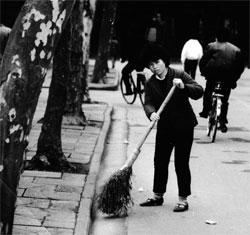 A street sweeper at the university.
A street sweeper at the university.I greet the same street sweepers, who every morning is sweeping the dirt away from all the avenues. I guide myself between chit chatting Chinese students, nods to the oncoming cyclists, and am glad that there are no cars here.
Often I forget that I am a student in a foreign country. Everyday life here is often just as tedious, as many are inclined to think about life in Denmark. But this morning when I look into the buildings where Chinese students live, it dawns on me that I find myself in a country far from the comfortable little kingdom.
I think of how different our worlds are. Here, many of the students live six people together at about 12 square meters without heat. They have no opportunity to determine when the light turns off. Power is simply disconnected eleven o'clock in the evening. Moreover, several of the students who participated in demonstrations for one and a half year ago or sympathized with it, has been removed or had difficulties in getting jobs.
Praising China
An hour after that I left my room, I sit in the classroom along with eight Japanese. Originally we were eight Japanese, three Americans, one Russian and me. But as time has gone, the other Westerners have more or less dropped out.
It is not fun to sit three hours in a north-facing, moist classroom without any heating, while the climate outside resembles of a mild Danish winter.
Teaching is in Chinese, starting today with the learning of new words for today's text. The texts are often a celebration of China and its people. Stories of hard working students and energetic peasants or laborers.
Or they are about China's countless inventions through the ages, such as porcelain, the compass and gunpowder. Today, the topic is self-sacrificing:
A young girl gets off the bus. During the drive, she gets carsick, which an older gentleman immediately notice. He hurries to take his brand new hat, and let her throw up in it. Thereby, the old man rescued the bystanders clothes from becoming dirty. All passengers were moved. Even the narrator is so overwhelmed that he almost forgets to get off the bus.
Easy for the Japanese
It is difficult to follow the pace of learning new characters which the Japanese have a distinct advantage because they know the most important characters, but only lacks the pronunciation.
The weather has changed for the return. The sun is shining and the temperature outside is several degrees higher than in the classroom. Back in my room, I just drink a cup of green tea before today's exciting questions are answered: 'Are there any mail today'? That is not so and I continue crestfallen to the canteen, where I once put my stomach and taste buds on a hard test. Lunch is, as all the previous days, cold, slimy, oily and unappetizing.
As the weather is still fine, I take the opportunity to go down to the market, which is ten minutes walk from our foreign quarter.
MOSTly Chinese cabbage
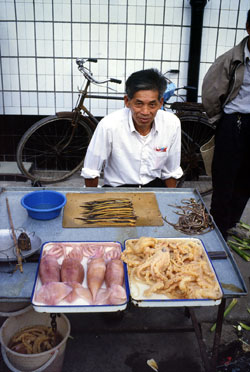 Freshly caught squids and eels.
Freshly caught squids and eels.I love the atmosphere at the market. Loaded bicycles trying to get through the crowd of traders, buyers and curious people as myself. I pass the vegetable stalls, which even here in winter are full of fresh vegetables, including Chinese cabbage, of course, that represents the major part, but also tomatoes, cucumbers, onions, potatoes, carrots and various spices are richly represented.
In the fruit stalls, I see apples, pears, bananas, oranges, melons, pineapples and various nuts. While I am amazed at the diversity of products, an elderly woman has lined up to look a bit closer at me.
The hen, which she purchased at the booth on the other side of the road, gives a loud protest scream at being carried in its legs with the head hanging down. A little further down the street, a butcher is carving the all too fatty pork, while lungs and stomach hangs, waiting for a buyer.
Not far away the shoemaker soling a pair of shoes. At another place the fishmongers is presenting today's large selection of different fish, shellfish and turtles. I stop and wonder where the fish comes from, since rivers and streams around Shanghai is extremely polluted. Behind our foreign ghetto, a river runs with water almost as thick and black as oil.
ARE YOU FROM U.S.A.?
I do not have time to wonder for long, because one standing close by ask: ‘Are you from America’? One of the usual conversations is ongoing, which also includes the following question: 'What are you doing? How long have you studied Chinese? How long have you been in China? What are your parents doing? How much does the chair cost?’ The conversation often stops with these standard phrases, partly because my vocabulary is still limited, but also because I cannot possibly tell how much an electric wheelchair costs, without leaving an impression that I am a millionaire.
40 new characters
It is time that I go back home to prepare for the next day. I must learn well over 40 new Chinese characters, which the new text contains and still try to remember the old ones. Furthermore, I have a few assignments of grammar to be made.
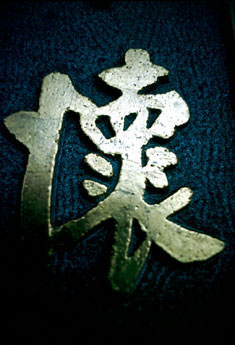 |
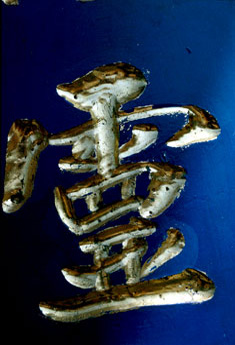 |
After another uncomfortable meeting with our canteen and a little more reading, I end the day with a cup of coffee and later a beer in our small café. It is our place for meeting with each. There will be enthusiastically discussions about life's big questions, or some will play cards or chess, and others is writing letters. And others get private lessons from some of the Chinese students also studying at Fudan.
Besides being a meeting place for us, the foreign students, I also consider the place to be one of reasons that we isolate ourselves even more from the Chinese. It is extremely difficult for Chinese, not connected to Fudan, to be allowed to visit our ghetto. All the Chinese who do not work inside our walls coated with shards of glass must be registered as soon as they enter the gate, which means that many do not like to come here. And many of us foreigners are perhaps inclined to think: ‘Why go out when we have our own little cafe?’